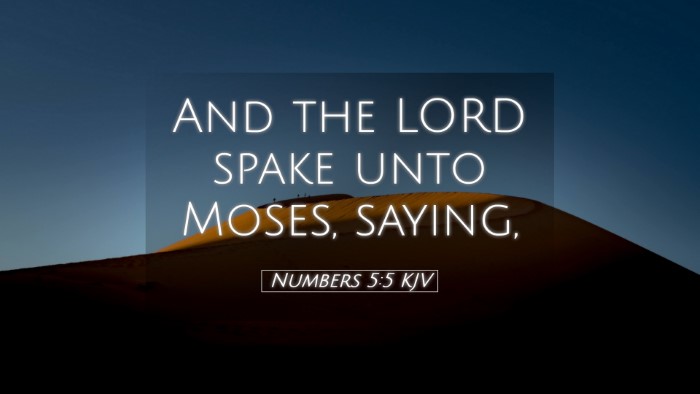Commentary on Numbers 5:5
Verse: "And the LORD spake unto Moses, saying," (Numbers 5:5)
Introduction
Numbers 5:5 is a pivotal verse in the prescribed laws for the Israelites, revealing the Lord's instructions regarding offenses and Holy regulations within the camp. The verse serves as a prelude to the directives that follow, aimed at maintaining the sanctity and purity of the community.
The Divine Source of Law
Divine Command: This verse underscores the importance of recognizing that the laws given to Israel were directly from God.
- Matthew Henry notes that God's commands are not suggestions, but authoritative directives intended to guide His people in holy living.
- Albert Barnes emphasizes that the rules laid out are in response to violations of God’s Will and serve to guide communal relationships and responsibilities.
The Community Aspect of Commandments
Purpose of the Commandments: The laws outlined in the subsequent verses seek to address not only individual responsibilities but also communal harmony. God’s intention is to forge a community where righteousness prevails.
- Adam Clarke highlights that the laws are designed to safeguard the integrity of both individuals and the congregation as a whole.
- Henry further elaborates that offenses, whether they be personal or communal, cannot be taken lightly, as they disrupt the divinely ordained order.
Insights on Moral and Spiritual Purity
Moral Implications: The command issued by God signifies the seriousness of sin and the consequential need for repentance and restoration within the community.
- Barnes points out that these laws serve to make individuals conscious of their need to remain pure and aligned with God's Statutes, recognizing that sin has repercussions beyond the individual.
- Clarke connects this with the New Testament principles of accountability and confession within the Christian community, where believers are called to uphold one another in love and truth.
The Role of Moses as Mediator
Moses’ Leadership: The verse highlights Moses’ role as the mouthpiece of God, a mediator who receives God’s instruction and conveys it to the people.
- Henry elaborates on Moses as a figure who not only leads but intercedes on behalf of the Israelites, creating a bridge between God’s holiness and the people's needs.
- Barnes notes Moses' vital role in teaching the law and ensuring the people's understanding of the required steps toward reconciliation with God.
Theological Applications
The Nature of God: This verse affirms the character of God as one who desires holiness among His people.
- Clarke states that God’s directives are not arbitrary; they are founded in His nature, which is both just and loving.
- Barnes adds that God’s communication with Moses demonstrates His ongoing relationship with humanity, emphasizing that instruction and discipline are forms of divine care.
Conclusion
In summary, Numbers 5:5 serves as more than just an introductory line for subsequent laws; it encapsulates core themes of divine authority, moral integrity, communal responsibility, and the character of God. The verse invites personal and communal reflection on how we respond to divine directives in our modern context, as leaders, students, and scholars alike are called to uphold and promote the values of purity and accountability within their spheres of influence.


